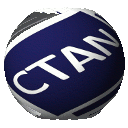Directory macros/latex/contrib/nicetext
README
README for the NICETEXT bundle
Minimal Markup for Documenting, Text Filtering, ...
(c) 2009-2015 Uwe Lueck http://contact-ednotes.sty.de.vu
== General Idea ==
The NICETEXT bundle supports "minimal" markup syntax for rather
simple kinds of text. The code you type should show little more
characters than are printed, though you get LaTeX quality. We
try to do away with backslashes, technical terms, and curly
braces (clumsy to type ... - "syntactic sugar").
Main focus is easy documentation of LaTeX packages.
Preprocessing by Perl or so is replaced by TeX macros
(reviving/generalizing the `docstrip' idea), including
expandable, safe, correct string substitution and typographical
enhancements of plain text for LaTeX input.
== Packages ==
`wiki.sty' addresses general kinds of texts. `niceverb.sty' is
made for documenting LaTeX packages. `niceverb.sty' especially
offers [almost-]WYSIWIG for meta-variables (macro arguments)
and for referring to commands (and their syntax) in footnotes,
section titles etc. E.g., to get the syntax description
\foo[<opt-arg>]{<mand-arg>}
you just type
\foo[<opt-arg>]{<mand-arg>}
!-)
`fifinddo.sty' provides basic setup for text filtering,
especially string substitution. `makedoc.sty' extends it to
provide a simple script language for transforming plain text
package files into LaTeX input files [manual!?]. One LaTeX run
can perform preprocessing and typesetting.
== Comparisons ==
One source of inspiration is the markup syntax of editing
Wikipedia pages. `wiki.sty' of the bundle offers something
similar as a LaTeX front-end for italics, boldface, sectioning,
and certain list-like environments. This is also similar to
`easylatex',
http://www.ctan.org/pkg/easylatex
which is more powerful and uses Perl. NICETEXT, by contrast,
consists just of LaTeX packages, working on any TeX
installation [!? note restrictions in `fifinddo.pdf'].
Cf. also preprocessor packages `txt2tex' and `txt2latex'.
Regarding "self-documentation," there is a difference to
current `\DocInput', similar ideas are in `gmdoc' and
`lineno.sty', see `niceverb.pdf' and `makedoc.pdf'. Standard
`doc.sty' and `contrib' extensions of it are rather avoided.
There are several *LaTeX macro* packages for processing text or
databases or for editing TeX's input stream while typesetting
-- see `fifinddo.pdf'. What seems to be new here is
*expandable string substitution* and safe, correct detection of
substrings -- discussed in `fifinddo.pdf'.
== Documentation ==
`fifinddo.pdf' describes `fifinddo.sty', typeset from
`fifinddo.tex'. `makedoc.pdf' describes `makedoc.sty', typeset
from `makedoc.tex'. `mdoccheat.pdf' is a list of script
commands, typeset from `mdocchea.tex'. `niceverb.pdf' describes
`niceverb.sty', typeset from `niceverb.tex'. Typesetting them
anew (for customizing printout) requires `makedoc.cfg',
`mdoccorr.cfg', and the *.sty files.
`wikicheat.pdf' is a one-page manual of `wiki.sty'. The file
`wiki.sty' contains additional documentation as plain text.
Note that certain features must be activated by commands in the
document environment.
`FILEs.txt' describes all the files contained in the bundle in one
line for each. Some descriptions too much for a line:
* SrcFILEs.txt describes TeX source files (macros, documentation)
together with their most recent version strings and revision
dates.
* nicetext.RLS summarizes each upload/release in a line or a
little more. With the `typeoutfileinfo' package, the command
line
typeoutfileinfo nicetext.RLS
produces a display of the most recent release that has been
installed on your system. `latexfileversion' and `ltxfileinfo'
probably provide a similar feature.
== Templates/Dialogue ==
txt to TeX functionality through \MakeDocCorrectHook can be
tried and applied with templates `fdtxttex.tpl' and
`makedoc.tpl' and in a dialogue started by running
`fdtxttex.tex'. Running `copyfile.tex', you get a dialogue
for "compressing" blank lines or text encoding conversion.
`substr.tex' should typeset the version of Harald Harders'
`substr.sty' next at your TeX installation. `arseneau.tex'
should typeset documentation of a few packages by Donald
Arseneau. MY results are `substr.pdf' and `arseneau.pdf'.
== License ==
Copying, distributing, modifying, using the files of the
`nicetext' bundle are allowed under the terms of the
LaTeX Project Public License, either version 1.3a or any later
version, the latest version is at
http://www.latex-project.org/lppl.txt
There is NO WARRANTY, and you must CARE indeed with `fifinddo'
and `makedoc', they will OVERWRITE existing files without
warning (because their main purpose is updating).
The bundle is AUTHOR-MAINTAINED in the sense of the LPPL.
Copyright (C) 2009-2012 Uwe Lueck,
http://www.contact-ednotes.sty.de.vu
Please report bugs, problems, and suggestions via the previous
web form.
== Installing/Required ==
`makedoc.sty' requires the `moreverb' package from
CTAN:/macros/latex/contrib/moreverb
You find the latest public version of the NICETEXT bundle at
http://mirror.ctan.org/macros/latex/contrib/nicetext/
A TDS version `nictext.tds.zip' is available at
http://mirror.ctan.org/install/macros/latex/contrib/
________________________________
[This file 2015/11/09 Uwe Lueck]
Download the contents of this package in one zip archive (2.6M).
nicetext – Minimal markup for simple text (Wikipedia style) and documentation
The bundle offers “minimal” markup syntax for various simple kinds of text. The user will typically involve little more than is printed, and will still get LaTeX quality.
The bundle provides four packages:
- wiki addresses general texts, marked up in the simple style used on Wikipedia;
- niceverb is yet another means of documenting LaTeX packages: it offers syntax-aware typesetting of meta-variables (macro arguments) and for referring to commands (and their syntax) in footnotes, section titles etc.;
- fifinddo aims to parse plain text or (La)TeX files using TeX, and to write the results to an external file; the package is used by another member of the bundle:
- makedoc, which provides the means to produce typeset documentation direct from package files.
| Package | nicetext |
| Support | http://www.webdesign-bu.de/uwe_lueck/contact.html |
| Version | r0.67 |
| Licenses | The LaTeX Project Public License 1.3 |
| Maintainer | Uwe Lück (deceased) |
| TDS archive | nicetext.tds.zip |
| Contained in | TeX Live as nicetext MiKTeX as nicetext |
| Topics | Markup |
| See also | gmdoc doc makedtx txt2latex easyLaTeX |
